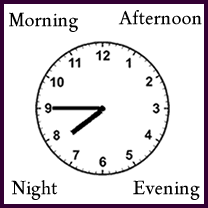
When does the morning start for you? How about the afternoon, evening or night? Does it vary from day to day, perhaps depending on the sun, or do you stick to clock time?
Dictionary definitions of these words are as follows:
morning – the time from sunrise to noon; the time from midnight to noon [source].
afternoon – the part of day between noon and sunset [source].
evening – the latter part and close of the day and early part of the night; the period from sunset or the evening meal to bedtime [source].
night – the time from dusk to dawn when no sunlight is visible [source].
For me mornings start when the sun rises. That can vary a lot here from just before 5am in the summer to 8:30am in the winter. I often wake up when the sun comes up, but don’t usually get up until later.
Afternoon starts just after midday (12pm) – that doesn’t vary, though my lunchtime may be between 12pm and 3pm. Here the sun sets between 4pm in the winter and nearly 10pm in summer. So my afternoons would be very long in the summer if they lasted until sunset. Instead I think of them as going until I have my evening meal, which is usually between 6pm and 7pm.
Evenings for me start after my evening meal and last until bedtime. Nights overlap somewhat, usually from when it gets dark until sunrise.
Not all languages distinguish between afternoon and evening – there is one word for both. In Spanish and Portuguese it’s tarde, in Catalan it’s tarda, in Greek it’s απόγευμα, in Irish it’s tráthnóna and in Scottish Gaelic it’s feasgar.
If you’re a native speaker of one of these languges, do you think of the time between noon and night as a one period?
Are there other ways of dividing the day in other languages?
Indonesian: pagi (dawn-10 a.m.); siang (10 a.m.–2 p.m.); sore (2 p.m.–sunset); malam (night). These are generally used when you say the time: jam 9 pagi.
In Bengali, the basic words to divide up the day are:
*ভোর [bʱoɹ]: ‘dawn’, around 4 to 5am
*সকাল [ʃɔkal]: ‘morning’, around 6am to noon
*দুপুর [d̪upuɹ]: ‘early afternoon’, around noon to 2 or 3pm
*বিকাল [bikal] or বিকেল [bikel]: ‘late afternoon’, around 3 or 4pm to sunset
*সন্ধ্যা [ʃɔnd̪ʱa ~ ʃond̪ʱe] or সাঁঝ [ʃãd͡ʑʱ]: ‘evening’, from sunset to around dinner
*রাত্র [ɹat̪ɹo], রাত্রি [ɹat̪ɹi], or রাত [ɹat̪]: ‘night’, when there is no daylight
Obviously, these don’t have strict edges so there can be some overlap.
These are all types of বেলা [bɛla], a word for ‘time’ or more narrowly ‘portion of the day’. When giving the time of day, it’s conventional to give the [bɛla] followed by the number, e.g. বিকাল ৫টা [bikal pãt͡ɕʈa] ‘late afternoon 5 o’clock’ vs. ভোর ৫টা [bʱoɹ pãt͡ɕʈa] ‘dawn 5 o’clock’, as a sort of equivalent of saying ‘5pm’ vs. ‘5am’.
You can also sometimes hear more complex [bɛla]s, such as compounds like ভোর রাত [bʱoɹ ɹat̪] ‘dawn night’ for the latest part of the night (~2-4am) and দুপুর রাত [d̪upuɹ ɹat̪] ‘midday night’, or Sanskritic words like মধ্যরাত্র [mod̪ʱːoɹat̪ɹo] ‘middle night’ for midnight (<Skt madhyarātra) or অপরাহ্ন [ɔpoɹanːo] 'later/other time of day' for the afternoon (<Skt aparāhna), but none of these are basic terms. So, you would not hear অপরাহ্ন ২টা [ɔpoɹanːo d̪ujʈa] for '2pm', even if it would literally be 'afternoon 2 o'clock'. You'll hear দুপুর ২টা [d̪upuɹ d̪ujʈa] instead.
Also I don’t think I’d ever thought consciously about it, but having written those out I see that the words সকাল [ʃɔkal] ‘morning’ and বিকাল [bikal] ‘late afternoon’ are borrowings from Sanskrit sakāla and vikāla. The first (sa-kāla) would mean something like ‘with time’, ‘having time’, ‘same time’, or ‘auspicious time’ while the second (vi-kāla) would mean something like ‘apart time’, ‘opposite time’, ‘other time’, or ‘inauspicious time’.
Looking these up in the Sanskrit dictionary, it looks like sakālam was an interjection meaning ‘seasonably, betimes, early in the morning’, while vikālaḥ was a noun meaning ‘evening, evening twilight, the close of day, improper time, unseasonable hour’; looks like these meanings narrowed and shifted slightly in Bengali.
I tend to class afternoon as when the sun is still strong, and evening when the light is fading and it’s cooler. 3-5 o’clock, I suppose. I also believe Hungarian has different terms for early and late morning, on similar lines?
Finnish has the words aamuyö (literally ‘morning night’, late night before sunrise), aamu (morning), aamupäivä (‘morning day’, just before noon), keskipäivä (‘middle day’, noon), iltapäivä (‘evening day’, afternoon), ilta (evening), iltayö (‘evening night’, just before midnight), keskiyö (‘middle night’, midnight). And then there are the words päivä (day), yö (night) and vuorokausi (the whole 24 hour period). We also use the word päivä to refer to the 24 hour period, vuorokausi isn’t so common in everyday speech.
In Spanish: la madrugada, midnight to dawn.